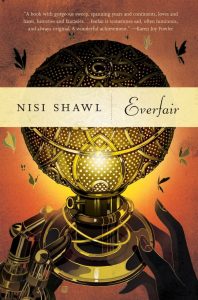 Everfair (Tor Books, 2016) is the debut novel from acclaimed speculative fiction short-story author Nisi Shawl. The book is an interesting read that showcases Shawl’s background with short stories, as some chapters could be short stories unto themselves. But the narrative framework of the book, which is more about the country of Everfair than the characters, ties the disparate threads together. The genre is a sort of alternate history, steampunk-fantasy, combining elements of steampunk technology with magic, including the mystical substance that is used to power aircraft and other similar technology.
Everfair (Tor Books, 2016) is the debut novel from acclaimed speculative fiction short-story author Nisi Shawl. The book is an interesting read that showcases Shawl’s background with short stories, as some chapters could be short stories unto themselves. But the narrative framework of the book, which is more about the country of Everfair than the characters, ties the disparate threads together. The genre is a sort of alternate history, steampunk-fantasy, combining elements of steampunk technology with magic, including the mystical substance that is used to power aircraft and other similar technology.
The country of Everfair is an African nation founded by individuals opposed to King Leopold’s stranglehold over the Congo and its resources. The founders include English members of the Fabian Society, American missionaries, Africans who have been enslaved by Leopold’s troops, and Chinese workers similarly forced to work in Africa. These groups put aside many of their differences in order to defeat Leopold’s troops and drive the Belgians from the Congo, clearing the path for them to establish their new nation.
The chapters run chronologically, covering a wide span of time from the origins of Everfair in the nineteenth century to the ending of World War I, but they follow different characters over time. Some characters are frequent point-of-view characters, while others have less of the spotlight on them. Similarly, some of the chapters are neatly contained story arcs, while others tie in more to the larger story of the history of Everfair.
As a historian, I found the structure of this novel much more like a history book than a traditional novel. As such, it’s not a quick read. I often read just a few chapters a night, needing to digest and consider the larger historical elements rather than charging through the story. Despite this, the book was fascinating, and I felt like the structure worked well for the story that Shawl wanted to tell.
Follow us online:
